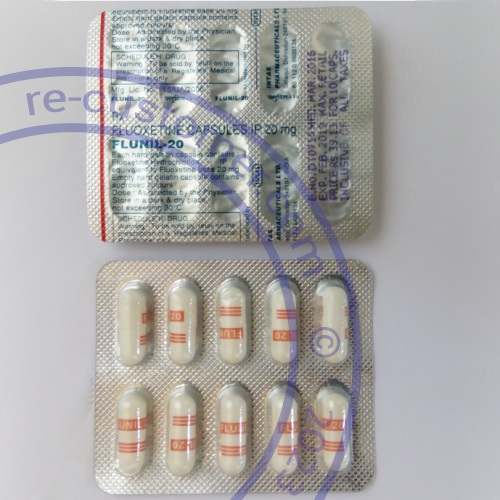- Trusted Tablets
- Antidepressants
- Fluoxetine

Brand(s): Cadflo / Flunil / Tritin
Manufacturer: Concept / Intas / Tripada
Disease(s): Depressive Disorder / Bulimia Nervosa (an Eating Disorder) Obsessive-compulsive Disorder / Panic Disorder / And Premenstrual Dysphoric Disorder (PMDD)
| Package | Price | Per pill | Savings | Order |
|---|---|---|---|---|
| 10mg × 180 capsules | R 1615.86 | R 8.98 | R 3444.60 | Add to cart |
| 10mg × 120 capsules | R 1292.51 | R 10.77 | R 2081.13 | Add to cart |
| 10mg × 90 capsules | R 1130.83 | R 12.56 | R 1399.40 | Add to cart |
| 10mg × 60 capsules | R 969.16 | R 16.15 | R 717.66 | Add to cart |
| 10mg × 30 capsules | R 843.41 | R 28.11 | Add to cart |
| Package | Price | Per pill | Savings | Order |
|---|---|---|---|---|
| 20mg × 180 capsules | R 1705.68 | R 9.48 | R 3678.13 | Add to cart |
| 20mg × 120 capsules | R 1346.40 | R 11.22 | R 2242.81 | Add to cart |
| 20mg × 90 capsules | R 1166.76 | R 12.96 | R 1525.14 | Add to cart |
| 20mg × 60 capsules | R 1041.01 | R 17.35 | R 753.59 | Add to cart |
| 20mg × 30 capsules | R 897.30 | R 29.91 | Add to cart |
| Package | Price | Per pill | Savings | Order |
|---|---|---|---|---|
| 40mg × 180 capsules | R 2424.24 | R 13.47 | R 3498.49 | Add to cart |
| 40mg × 120 capsules | R 1831.43 | R 15.26 | R 2117.06 | Add to cart |
| 40mg × 90 capsules | R 1535.02 | R 17.06 | R 1426.34 | Add to cart |
| 40mg × 60 capsules | R 1238.62 | R 20.64 | R 735.63 | Add to cart |
| 40mg × 30 capsules | R 987.12 | R 32.90 | Add to cart |
| Package | Price | Per pill | Savings | Order |
|---|---|---|---|---|
| 60mg × 180 capsules | R 2514.06 | R 13.97 | R 3732.02 | Add to cart |
| 60mg × 120 capsules | R 1885.32 | R 15.71 | R 2278.73 | Add to cart |
| 60mg × 90 capsules | R 1579.93 | R 17.55 | R 1543.11 | Add to cart |
| 60mg × 60 capsules | R 1256.58 | R 20.94 | R 825.45 | Add to cart |
| 60mg × 30 capsules | R 1041.01 | R 34.70 | Add to cart |
Fluoxetine capsules
What is this medicine?
FLUOXETINE is a selective serotonin reuptake inhibitors (SSRI) antidepressant. The way this medicine works is still not fully understood. It is thought to positively affect communication between nerve cells in the central nervous system and/or restore chemical balance in the brain.
Fluoxetine is used to treat major depressive disorder, bulimia nervosa (an eating disorder) obsessive-compulsive disorder, panic disorder, and premenstrual dysphoric disorder (PMDD).
Fluoxetine is sometimes used together with another medication called olanzapine (Zyprexa). to treat depression caused by bipolar disorder (manic depression). This combination is also used to treat depression after at least 2 other medications have been tried without successful treatment of symptoms.
What should I tell my health care providers before I take this medicine?
Do not use fluoxetine if you have taken an MAO inhibitor in the past 14 days. A dangerous drug interaction could occur. MAO inhibitors include isocarboxazid, linezolid, phenelzine, rasagiline, selegiline, and tranylcypromine. You must wait at least 14 days after stopping an MAO inhibitor before you can take fluoxetine. You must wait 5 weeks after stopping fluoxetine before you can take thioridazine or an MAOI.
You should not use fluoxetine if you are allergic to it, if you also take pimozide or thioridazine, or if you are being treated with methylene blue injection.
If you also take olanzapine (Zyprexa), read the Zyprexa medication guide and all patient warnings and instructions provided with that medication.
Tell your doctor about all other antidepressants you take, especially Celexa, Cymbalta, Desyrel, Effexor, Lexapro, Luvox, Oleptro, Paxil, Pexeva, Symbyax, Viibryd, or Zoloft.
To make sure fluoxetine is safe for you, tell your doctor if you have:
-
cirrhosis of the liver;
-
kidney disease;
-
diabetes;
-
narrow-angle glaucoma;
-
seizures or epilepsy;
-
bipolar disorder (manic depression);
-
a history of drug abuse or suicidal thoughts; or
-
if you are being treated with electroconvulsive therapy (ECT).
Some young people have thoughts about suicide when first taking an antidepressant. Your doctor will need to check your progress at regular visits while you are using fluoxetine. Your family or other caregivers should also be alert to changes in your mood or symptoms.
Taking an SSRI antidepressant during pregnancy may cause serious lung problems or other complications in the baby. However, you may have a relapse of depression if you stop taking your antidepressant. Tell your doctor right away if you become pregnant while taking fluoxetine. Do not start or stop taking this medicine during pregnancy without your doctor's advice.
Fluoxetine can pass into breast milk and may harm a nursing baby. Tell your doctor if you are breast-feeding a baby.
Do not give fluoxetine to anyone under 18 years old without medical advice.
How should I use this medicine?
Take fluoxetine exactly as prescribed by your doctor. Follow all directions on your prescription label. Your doctor may occasionally change your dose to make sure you get the best results. Do not take this medicine in larger or smaller amounts or for longer than recommended.
Do not crush, chew, break, or open a delayed-release capsule. Swallow it whole.
Measure liquid medicine with a special dose-measuring spoon or medicine cup. If you do not have a dose-measuring device, ask your pharmacist for one.
It may take up to 4 weeks before your symptoms improve. Keep using the medication as directed and tell your doctor if your symptoms do not improve.
Do not stop using fluoxetine suddenly, or you could have unpleasant withdrawal symptoms. Ask your doctor how to safely stop using fluoxetine.
To treat premenstrual dysphoric disorder, the usual dose of fluoxetine is once daily while you are having your period, or 14 days before you expect your period to start. Follow your doctor's instructions.
Store at room temperature away from moisture and heat.
What happens if I miss a dose?
Take the missed dose as soon as you remember. Skip the missed dose if it is almost time for your next scheduled dose. Do not take extra medicine to make up the missed dose.
If you miss a dose of Prozac Weekly, take the missed dose as soon as you remember and take the next dose 7 days later. However, if it is almost time for the next regularly scheduled weekly dose, skip the missed dose and take the next one as directed. Do not take extra medicine to make up the missed dose.
What may interact with this medicine?
Taking this medicine with other drugs that make you sleepy can worsen this effect. Ask your doctor before taking fluoxetine with a sleeping pill, narcotic pain medicine, muscle relaxer, or medicine for anxiety, depression, or seizures.
Many drugs can interact with fluoxetine. Not all possible interactions are listed here. Tell your doctor about all your medications and any you start or stop using during treatment with fluoxetine, especially:
-
any other antidepressant;
-
St. John's Wort;
-
tramadol;
-
tryptophan (sometimes called L-tryptophan);
-
a blood thinner - warfarin, Coumadin, Jantoven;
-
medicine to treat mood disorders, thought disorders, or mental illness - amitriptyline, desipramine, lithium, nortriptyline, and many others;
-
migraine headache medicine - rizatriptan, sumatriptan, zolmitriptan, and others; or
-
narcotic pain medicine - fentanyl, tramadol.
This list is not complete and many other drugs can interact with fluoxetine. This includes prescription and over-the-counter medicines, vitamins, and herbal products. Give a list of all your medicines to any healthcare provider who treats you.
What side effects may I notice from this medicine?
Get emergency medical help if you have any signs of an allergic reaction to fluoxetine: skin rash or hives; difficulty breathing; swelling of your face, lips, tongue, or throat.
Report any new or worsening symptoms to your doctor, such as: mood or behavior changes, anxiety, panic attacks, trouble sleeping, or if you feel impulsive, irritable, agitated, hostile, aggressive, restless, hyperactive (mentally or physically), more depressed, or have thoughts about suicide or hurting yourself.
Call your doctor at once if you have:
-
blurred vision, tunnel vision, eye pain or swelling, or seeing halos around lights;
-
high levels of serotonin in the body - agitation, hallucinations, fever, fast heart rate, overactive reflexes, nausea, vomiting, diarrhea, loss of coordination, fainting;
-
low levels of sodium in the body - headache, confusion, slurred speech, severe weakness, vomiting, loss of coordination, feeling unsteady;
-
severe nervous system reaction - very stiff (rigid) muscles, high fever, sweating, confusion, fast or uneven heartbeats, tremors, feeling like you might pass out; or
-
severe skin reaction - fever, sore throat, swelling in your face or tongue, burning in your eyes, skin pain, followed by a red or purple skin rash that spreads (especially in the face or upper body) and causes blistering and peeling.
Common fluoxetine side effects may include:
-
sleep problems (insomnia), strange dreams;
-
headache, dizziness, vision changes;
-
tremors or shaking, feeling anxious or nervous;
-
pain, weakness, yawning, tired feeling;
-
upset stomach, loss of appetite, nausea, vomiting, diarrhea;
-
dry mouth, sweating, hot flashes;
-
changes in weight or appetite;
-
stuffy nose, sinus pain, sore throat, flu symptoms; or
-
decreased sex drive, impotence, or difficulty having an orgasm.
This is not a complete list of side effects and others may occur.
What should I watch for while using this medicine?
Drinking alcohol can increase certain side effects of fluoxetine.
Ask your doctor before taking a nonsteroidal anti-inflammatory drug (NSAID) for pain, arthritis, fever, or swelling. This includes aspirin, ibuprofen (Advil, Motrin), naproxen (Aleve), celecoxib (Celebrex), diclofenac, indomethacin, meloxicam, and others. Using an NSAID with fluoxetine may cause you to bruise or bleed easily.
This medication may impair your thinking or reactions. Be careful if you drive or do anything that requires you to be alert.

Can i help you?



